“I Wanted To Show That Your Second Home Oftentimes Feels Like A Shitty Home.” A Conversation With Cooper Raiff, Director, Writer, And Star Of SHITHOUSE
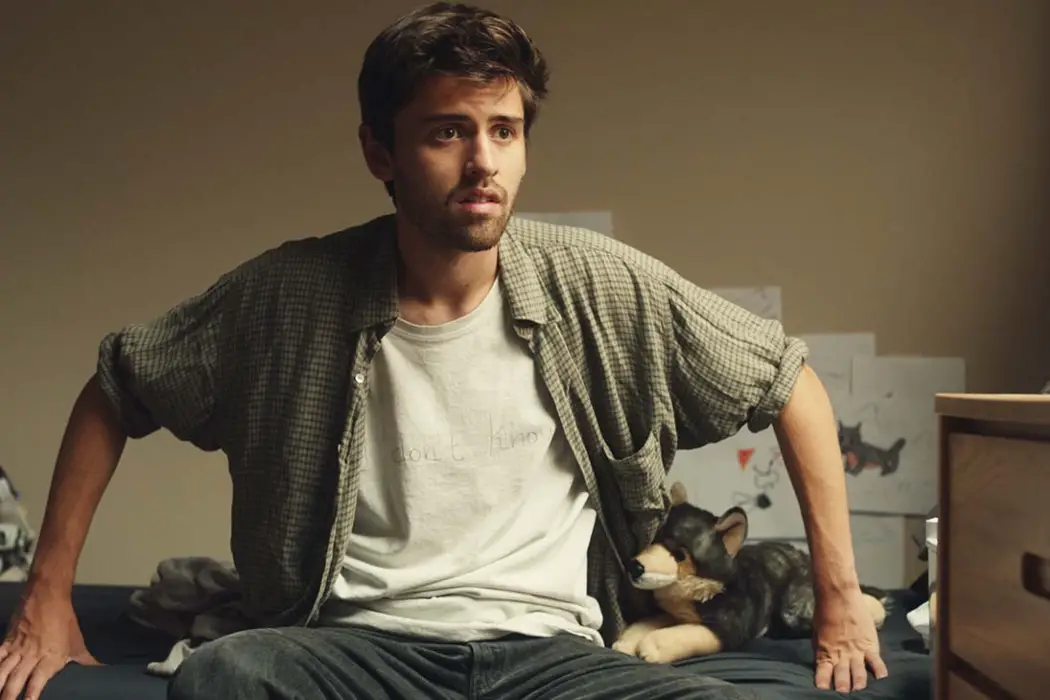
Reyzando Nawara is a passionate film and TV enthusiast from…
It’s quite fascinating when you realize that Cooper Raiff was just 22 when he directed, wrote, acted in, and co-edited his debut feature Shithouse, a gentle and heartwarming college dramedy which won the Grand Jury Prize for Best Narrative Feature at this year’s South by Southwest. But to solely focus on his age would actually dismiss the magic and craft Raiff has demonstrated so effortlessly in the movie.
On the surface, the story of Shithouse is one you’ve probably heard of a million times before: a freshman named Alex (played wonderfully by Raiff) trying to forge a new connection with an independent and articulate sophomore student named Maggie (Dylan Gelula, equally marvelous) over one weekend. But where most college movies tend to zoom in on the fun and the excitement of college while exploring the main relationships of its lead character(s), Raiff tries to approach this story from a more vulnerable place. He allows his character to be sensitive; to show his struggle and get in touch with his feelings in a way that’s not often seen in other college movies. And in the end, that’s what makes Shithouse, despite some familiar tropes, feel refreshing, and even revolutionary.
I recently spoke with Raiff over Zoom to talk about the movie, and discuss why he’s so interested in telling this painful yet realistic part of the college experience, what the movie means to him, and even a little about Babyteeth and Eliza Scanlen too.
(This interview has been cut and edited for clarity)
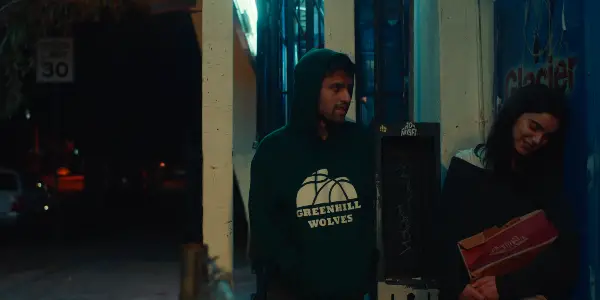
Reyzando Nawara for Film Inquiry: Congratulations on the movie! It was such a special experience watching it. Every aspect is just brilliantly executed; the direction, the writing, the performances — you, Amy, Dylan, and everyone is so wonderful. And on top of that, it’s so refreshing to see a college movie that is this open and heartfelt. Which brings me to this: for a movie that is so gentle and warm, with a lead character who’s extremely vulnerable, why did you decide to name it Shithouse? Is there any metaphorical meaning about it?
Cooper Raiff: That’s a great question. Thank you so much for saying that. I really appreciate you watching and saying all that. And about the title; I always love when they’re, like, the starting point from movies because I think it’s the first thing you see. And to just start there then go into this endearing movie is what I really like about it, psychologically. But also, the movie is about a shitty home for my character Alex. He sees college as a shitty home because, for 18 years, he had this major safety net, then when he went to college, he didn’t know how to create a home for himself. So when he hears about the party at “Shithouse,” his attitude is like, “Oh my god, this is a perfect metaphor for how awful this is.” Maybe the reason why he feels that way is that he does not have the right tool to make college a better home for himself. And I wanted to show that your second home oftentimes feels like a shitty home in a really blunt and absurd way. And so I really like the title. But we just changed it internationally…
Oh yeah? I didn’t know about that…
Cooper Raiff: Yeah, we’re calling it Freshman Year internationally, hoping that people will be interested. It’s an American thing calling it freshman year; abroad they usually call it the first year. So I hope it could be interesting to people outside of the U.S.
It’s so interesting, anyway, that you said college is so shitty, cause, yeah, I totally agree with that. College, or any second home actually, is indeed shitty. And your movie, and in a lot of ways, your character too, really captures that feeling. Is this always something you’ve always wanted to say when you first wrote the movie, how scary it is to reinvent ourselves in a new place?
Cooper Raiff: Yeah, I really wanted to say that. I think for a lot of people, going to college is the first time where you have to make up all your choices and decisions by yourself and to put yourself out there. And if you don’t, you’re just gonna be, like, in your room all day and have zero friends. I wanted to show the extreme of that, and how important is to simply go out. But also to show that no one is above it.
In high school, Alex was this guy who spoke at the graduation. He had all these friends and personality and reputation. So when he arrived at college, he expected things of people. But, of course, everyone is going through their own exorcism, so they’re not about connections or relationships in a way that Alex thinks he’s so interested in. And the minute he realizes that, he starts to feel like he’s invincible, and that makes him upset and even more paralyzed than he already is.
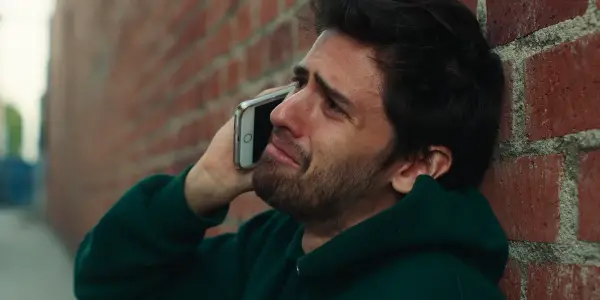
I think that’s why a lot of people relate to your movie in a really big way. Not everyone is going to college, but at some point in their lives, everyone will leave their first home and go through what Alex is going through. And it’s so interesting to see that plays out really well in your movie, which in so many ways, reminds of an HBO show from last year. I don’t know if you’ve seen it, but it’s called Mrs. Fletcher.
Cooper Raiff: Oh yeah, yeah, yeah… I haven’t seen it, but I know about it. I love Kathryn Hahn so much.
She’s wonderful in it! The stuff with Alex and his mom actually remind me a lot of the main plot in Mrs. Fletcher. In the show, the son of the titular character is going through the same thing as Alex. He’s popular in high school, but when he went to college, he’s struggling to adjust to it in the same way Alex was. And it’s just so rare to see this kind of character, who is as vulnerable and sensitive as Alex, to exist in college movies or shows.
Cooper Raiff: Yeah, it’s super raw. Thank you for pointing that out.
Of course! What I wanna know is, did you always plan to show this devastating dynamic between Alex and his mom? How the one who’s struggling is not just the kid but also the parent?
Cooper Raiff: Yeah, that was, like, the main thing I experienced going to college. I think, in order to survive and endure and move forward at college is that you kinda have to forget about your parents, because if you start thinking about how devastating it is to be a parent, it becomes so paralyzing. And that’s what happened with me in my freshman year. I was just constantly putting all of my weights onto my mom.
I just think it’s crazy for parents to drive their kids to school and drop them off and just leave them there; it must be the hardest thing in the world. Alex, in so many ways, is consumed by that devastating thought. He knows that his mom is tearing up on the other end, and that’s holding him back in a big way. In that final phone call, what was so emotional for me is when Alex’s like “I’m sorry that it was so shitty to be a mom.” And then there’s also a brief moment too where the mom looks at Alex’s sister, and I think she has this feeling of “Oh, she’s gonna be gone too one day.”
For kids going to college, there’s this moment where your world is opening up in such a huge way. But for parents, it’s just one thing missing now. So it’s not like their whole life is over, but still, it’s just intensely painful, I imagine. So with Shithouse, I wanted to make a movie for my mom to say that “Yeah, I see you crying on the other end. And thanks that you’re holding back your tears, because otherwise, I don’t think I’ll be able to move. And thanks again for being so strong and for being such a great mom for 18 years. I hope that we can still relate to each other in new ways now that I’m an adult.”
Oh yeah, that part when Alex’s mom stares at his sister in the car is just so heart-crushing.
Cooper Raiff: It really is. And that’s my visceral memory was like. I didn’t even see what was happening over there cause we were talking on the phone, but that’s what I always pictured. I don’t know, yeah, it’s sad.
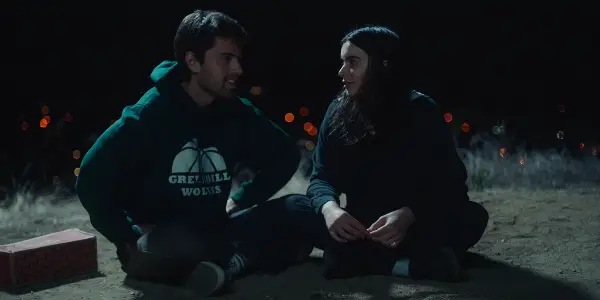
The dynamic between Alex and his mom, in a way, mirrors that of Alex and Maggie (Gelula). So what I wanna know is why did you want to show these two relationships? Why didn’t you just focus on Alex and Maggie, or the other way around?
Cooper Raiff: That’s a great question. I think it’s cause, like, they’re basically the same stories. There’s actually some cut in the first draft, where we edited the shot from Amy’s face to Maggie’s to show the similarity, but I was like “No, that’s not the main point.” What the movie is mainly about is to show that Alex is someone who kinda jumps from a comfort zone to another comfort zone. And at the beginning of the movie, his comfort zone is when he’s on the phone with his mom.
And then he spends this wonderful night with this girl who’s a total foil and a total opposite and definitely not someone he’s compatible with at all. But they spend this awesome night together, and in a way, she becomes his new safety net. But when the next morning this girl is not there to take care of him in any way, he comes to the realization that “Oh… I have to take care of myself here, and have to just do it on my own and create a home from myself before I can go into someone else’s house, or someone else can come into mine.”
But yeah, to answer the question better: it is like a love story to me. Maggie is based on this girl named Madeline who I dated for three years, and that relationship is like the biggest thing in my life, still. And my relationship with my mom is the other biggest thing. So I just wanna make a movie about those two relationships, really.
In the movie, there’s a 2.5 years time jump. And we don’t know what happens during that time before the epilogue. Can you give us some insights into what is it that eventually makes Maggie decide to change her mind and open up to an idea that it’s okay to depend on other people, to finally give Alex a chance to be with her after the time jump?
Cooper Raiff: That epilogue, I just wanted to complete the arcs for the characters. For Alex, when he has that phone call with his mom, he says “I at least wanna try.” So that last scene, in a way, is Maggie’s “I at least wanna try,” moment. But I don’t think that they’re gonna end up together. The final shot is them walking into the dark, into the unknown, so it’s possible that their relationship might just last for two weeks. But I loved the idea of seeing Maggie taking the leap, and I knew that it wouldn’t happen unless there’s some time jump. At the beginning of their first meeting, Maggie felt that Alex didn’t treat her very well. So she felt like she still had room to treat him kinda badly. But they did fall in love with each other that night. And during the 2.5 years period before the epilogue, Maggie is trying to see — not to test — if he really does love her that much after all this time. And turns out, he does; he’s deeply in love with her.
Dylan is so great at playing Maggie. She brings this quiet intensity and depth to the character. But you’re also great as Alex. And what’s so fascinating to me is the way you navigate yourself as an actor but still also able to draw this intimate story and strong performances from all the cast as both a writer and a director. How did you do all of that?
Cooper Raiff: It’s actually really hard. It’s impossible because it really takes so much passion and professionalism from everybody else. I’m just constantly running around, and my mind is in so many different places at the same time. The movie simply wouldn’t have worked unless Dylan wasn’t the most fantastic actor in the world, and like the most focused and unwavering person. She’s so rigid in who she is Maggie, so the only direction from me was just about the arcs, thinking about the bigger picture.
There was never a false note when we were doing a scene. There was never a question of “Does this feel organic? Does this feel real?” — cause sharing a scene with Dylan, it always felt real. The directing was just a matter of “Oh, I need this thing to land later, so I think it needs to go in this direction.” But there’s no directing in terms of “Oh can you act a little bit better here?” And that was actually really nice because it would’ve been so weird if I’m acting in the scene with Dylan then commenting on her performance. I feel like that would’ve been super weird. So I’m glad that I never had to do that really because she was so good.
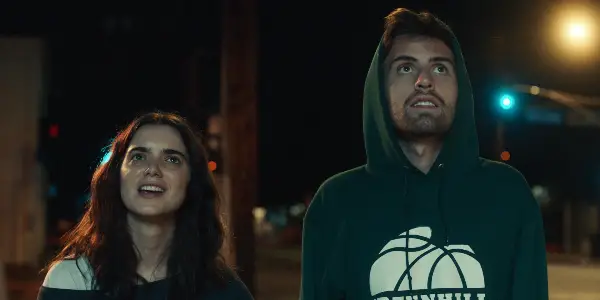
I’m curious, were there some scenes that didn’t make the final cut but ones that you wished did?
Cooper Raiff: Yeah, Maggie’s mom actually had a big arc. Maggie’s childhood home was being sold, and she found out on the phone with her mom, and that whole plotline just got completely cut because if it was included, the movie then was gonna be over 2 hours. That stuff with Maggie’s younger sister also got cut, and it was really a big regret. I just wasn’t compact enough in terms of writing, to make people not to fall asleep while watching the movie if those two parts were included. So I had to cut it, but yeah, it sucks cause I really did love that.
Maybe you can include it on the DVD or Blu-ray in the future. I have one last question; it’s not related to the filmmaking or the story or the characters, but I promise you that it’s an important one. If you have to choose one movie from this year as a double feature to Shithouse, what would you pick?
Cooper Raiff: From this year? Uhm… Babyteeth. That’s a good movie. I cannot tell you how much I love Eliza Scanlen. I think she’s amazing. I really, I hope we work together someday. So yeah, I definitely would want Babyteeth as a double feature. I think it would have to be Babyteeth first because it’s really sad, and then Shithouse after, which ends in such a corny, nice way. I feel like people will want to leave that way but still be feeling all the feelings throughout. It may be an intense double feature though, but I think it’d be awesome. A lot of feelings.
Oh, that’s such a great pick! And totally agree that Eliza is so talented. I hope that one day you get to be in a project with her, where maybe her characters do not die.
Cooper Raiff: Yes! Anyway, she’s also an amazing writer and director. I think we’ll work together someday.
Finger crossed. But anyway, that’s all from me. Congratulations once again on the movie, and thank you for taking the time to talk to me.
Cooper Raiff: Thank you so much. I really appreciate your time.
Film Inquiry would like to thank Cooper Raif for taking the time to speak with us!
Shithouse is now playing in select theaters and streaming on VOD everywhere.
Watch Shithouse
Does content like this matter to you?
Become a Member and support film journalism. Unlock access to all of Film Inquiry`s great articles. Join a community of like-minded readers who are passionate about cinema - get access to our private members Network, give back to independent filmmakers, and more.
Reyzando Nawara is a passionate film and TV enthusiast from Indonesia. When he's not watching TV and movies, he likes to cook and make sorbet.













